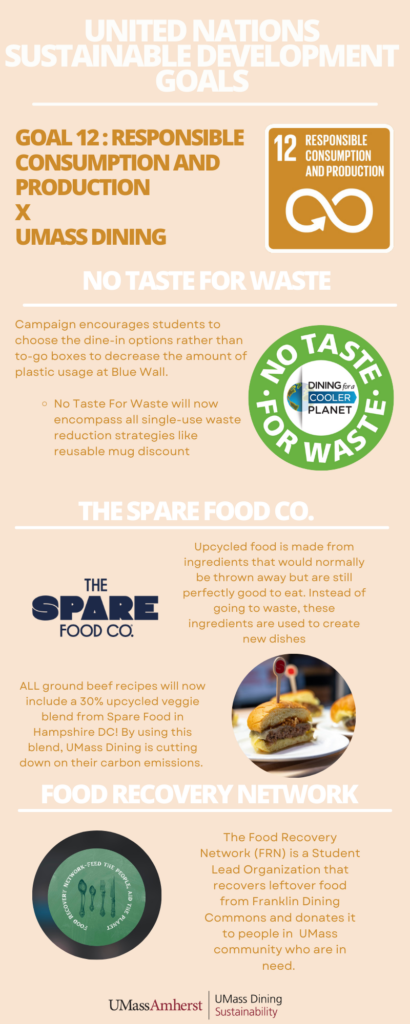UMass Amherst Dining is leading a transformative shift toward sustainability with its “No Taste For Waste” campaign. No Taste For Waste is focused on reducing single-use waste and promoting responsible consumption, this campaign aligns closely with Sustainable Development Goal 12: Responsible Consumption and Production. This SDG emphasizes sustainable management and efficient use of natural resources, reducing waste generation, and encouraging eco-friendly practices all of which are at the heart of these UMass Dining’s initiatives. sustainable choices.
Encouraging Dine-In Over To-Go Options
One of the main goals of the No Taste For Waste campaign is to reduce single-use waste by encouraging students to dine in rather than use to-go containers particularly at Blue Wall. By making dine-in options more accessible and convenient, UMass Dining is actively working to reduce plastic and other disposable waste directly supporting SDG 12. By limiting the amount of plastic waste generated from take-out packaging, students can help conserve resources and reduce landfill impact. This small, everyday choice is a practical step toward sustainable consumption and directly contributes to the campus-wide goal of minimizing waste.
SPARE Food Co.: Reducing Food Waste with Upcycled Ingredients
UMass Dining’s partnership with SPARE Food Co. is another significant initiative supporting SDG Goal 12. Upcycled food involves repurposing ingredients that would normally be discarded but are still fresh and safe for consumption. By blending 30% upcycled vegetables into ground beef recipes at Hampshire DC, UMass Dining cuts down on food waste and lowers its carbon footprint. This practice not only showcases innovation in sustainable food production but also helps educate students on the importance of using resources responsibly and reducing food waste. By integrating upcycled ingredients, this partnership aligns with SDG 12’s goal of responsible consumption and production by ensuring that food is used to its full potential instead of going to waste.
Food Recovery Network: Addressing Food Insecurity and Waste
Another impactful initiative is the support of the Food Recovery Network, a student-led organization dedicated to reducing food waste and addressing food insecurity. The Food Recovery Network collects surplus food from Franklin Dining Commons and redistributes it to members of the UMass community in need. This initiative directly contributes to SDG 12 by minimizing food waste and maximizing the use of existing resources instead of allowing surplus food to go to waste.
Small Choices for Big Impact: Supporting SDG Goal 12
These initiative and partnerships highlight how simple choice like dining in, choosing reusable containers, and supporting food recovery can collectively make a significant impact. By making it easy for students to participate in sustainable practices, UMass Dining is fostering a culture of responsibility, teaching students how to reduce their environmental footprint and inspiring them to continue these practices beyond the campus.

